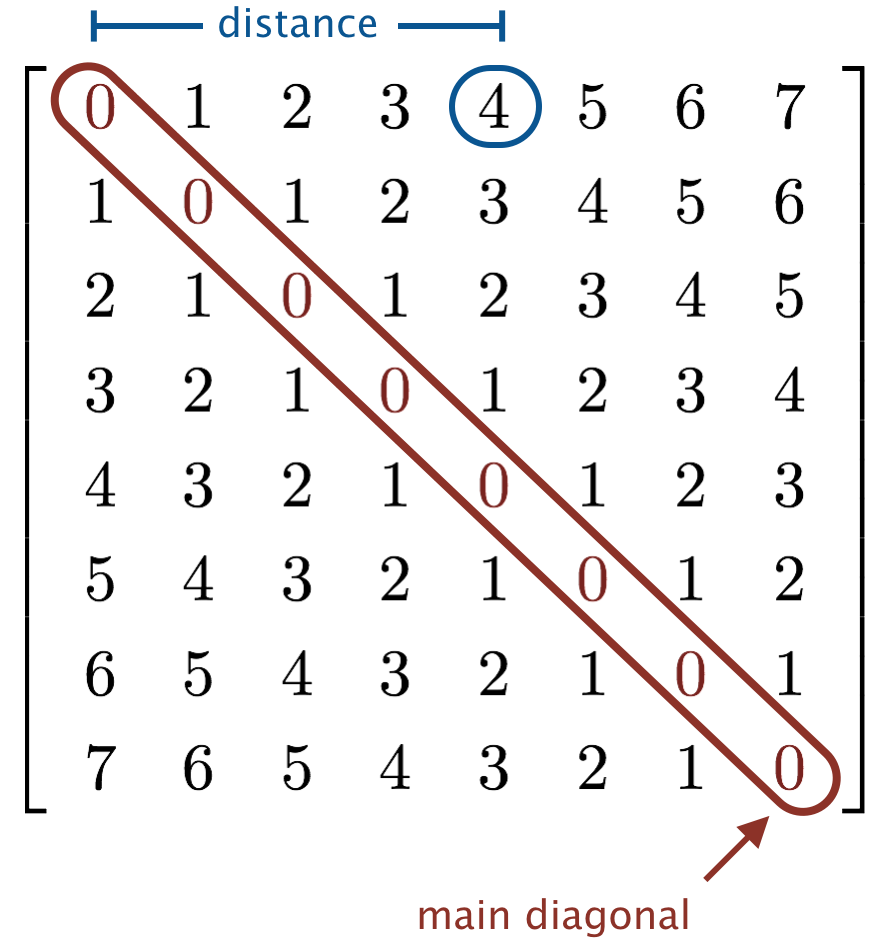Coursera - Computer Science: Programming With A Purpose
Week 2: Conditionals And Loops - Band Matrices
Write a program BandMatrix.java that takes two integer command-line arguments n and width and prints an n-by-n pattern like the ones below, with a zero (0) for each element whose distance from the main diagonal is strictly more than width, and an asterisk (*) for each entry that is not, and two spaces between each 0 or *.

Here, distance means the minimum number of cells you have to move (either left, right, up, or down) to reach any element on the main diagonal.
~/Desktop/loops> java BandMatrix 8 0
* 0 0 0 0 0 0 0
0 * 0 0 0 0 0 0
0 0 * 0 0 0 0 0
0 0 0 * 0 0 0 0
0 0 0 0 * 0 0 0
0 0 0 0 0 * 0 0
0 0 0 0 0 0 * 0
0 0 0 0 0 0 0 *
~/Desktop/loops> java BandMatrix 8 1
* * 0 0 0 0 0 0
* * * 0 0 0 0 0
0 * * * 0 0 0 0
0 0 * * * 0 0 0
0 0 0 * * * 0 0
0 0 0 0 * * * 0
0 0 0 0 0 * * *
0 0 0 0 0 0 * *
~/Desktop/loops> java BandMatrix 8 2
* * * 0 0 0 0 0
* * * * 0 0 0 0
* * * * * 0 0 0
0 * * * * * 0 0
0 0 * * * * * 0
0 0 0 * * * * *
0 0 0 0 * * * *
0 0 0 0 0 * * *
~/Desktop/loops> java BandMatrix 8 3
* * * * 0 0 0 0
* * * * * 0 0 0
* * * * * * 0 0
* * * * * * * 0
0 * * * * * * *
0 0 * * * * * *
0 0 0 * * * * *
0 0 0 0 * * * *
Note: you may assume that n and width are non-negative integer.
Band matrices are matrices whose nonzero entries are restricted to a diagonal band. They arise frequently in numerical linear algebra.
Note: the above description is copied from Coursera and converted to markdown for convenience
Solution:
public class BandMatrix {
public static void main(String[] args) {
final int n = Integer.parseInt(args[0]);
final int width = Integer.parseInt(args[1]);
for (int y = 0; y < n; y++) {
for (int x = 0; x < n; x++) {
if (Math.abs(x - y) > width) {
if (x == 0) {
System.out.print("0");
} else {
System.out.print(" 0");
}
} else {
if (x == 0) {
System.out.print("*");
} else {
System.out.print(" *");
}
}
}
System.out.println();
}
}
}
Link To: Java Source Code